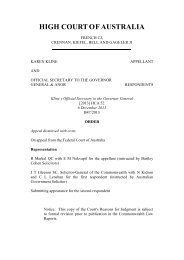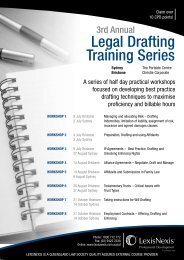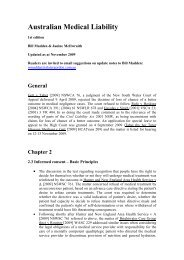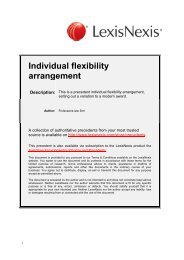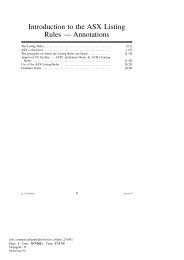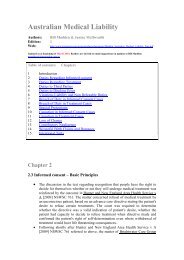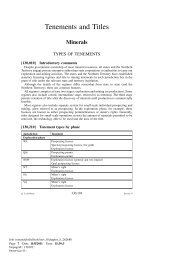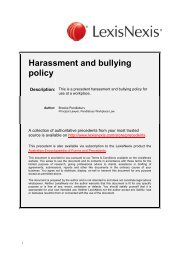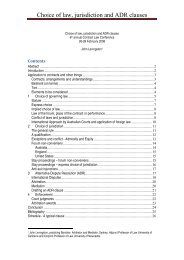Copyright LexisNexis. Sample only, not for classroom use or ...
Copyright LexisNexis. Sample only, not for classroom use or ...
Copyright LexisNexis. Sample only, not for classroom use or ...
You also want an ePaper? Increase the reach of your titles
YUMPU automatically turns print PDFs into web optimized ePapers that Google loves.
285<br />
CHAPTER 12: EQUITABLE ESTOPPEL<br />
roots at the expense of equitable influences. He denied that it could act as a sw<strong>or</strong>d and limited its role<br />
to establishing the state of affairs by which the court was to resolve the dispute — in other w<strong>or</strong>ds,<br />
his estoppel was to have the evidentiary quality so often referred to at common law. Consequently,<br />
his view that the ‘prima facie entitlement’ of a successful claimant is simply to have the assumption<br />
made good is a logical conclusion. However, he did admit that the availability of that remedy should<br />
be qualified if such ‘relief would exceed what could be justified by the requirements of conscientious<br />
conduct and would be unjust to the estopped party’: Commonwealth v Verwayen at CLR 442; ALR<br />
354. F<strong>or</strong> a number of reasons, Deane J’s view has <strong>not</strong> attracted much supp<strong>or</strong>t from commentat<strong>or</strong>s <strong>or</strong><br />
his fellow judges. Its chief failure would seem to be the rejection of estoppel as a source of substantive<br />
rights — a position to which it would now seem quite difficult to return.<br />
12.68 The proposal by Mason CJ is very different from that of Deane J. In Commonwealth<br />
v Verwayen, at CLR 413; ALR 333, Mason CJ said:<br />
[I]t would confound principle and common sense to maintain that estoppel by conduct occupies<br />
a special field which has as its hallmark function the making good of assumptions. There is no<br />
longer any purpose to be served in recognising an evidentiary <strong>f<strong>or</strong></strong>m of estoppel operating in the<br />
same circumstances as the emergent rules of substantive estoppel. The result is that it should be<br />
accepted that there is but one doctrine of estoppel, which provides that a court of common law<br />
<strong>or</strong> equity may do what is required, but <strong>not</strong> m<strong>or</strong>e, to prevent a person who has relied upon an<br />
assumption as to a present, past <strong>or</strong> future state of affairs (including a legal state of affairs), which<br />
assumption the party estopped has induced him to hold, from suffering detriment in reliance<br />
upon the assumption as a result of the denial of its c<strong>or</strong>rectness. A central element of that doctrine<br />
is that there must be a prop<strong>or</strong>tionality between the remedy and the detriment which is its purpose<br />
to avoid. It would be wholly inequitable and unjust to insist upon a disprop<strong>or</strong>tionate making<br />
good of the relevant assumption.<br />
12.69 The impetus <strong>f<strong>or</strong></strong> unification seems to have lessened since the decision in Commonwealth<br />
v Verwayen. Writing extra-judicially in 2006, Justice Handley of the New South Wales Court of<br />
Appeal said:<br />
Any single overarching doctrine [of estoppel] would be at such a high level of abstraction that<br />
it would serve no <strong>use</strong>ful purpose. Each <strong>f<strong>or</strong></strong>m of estoppel has its own elements, although some<br />
are common to others. The similarities warrant their recognition as a <strong>f<strong>or</strong></strong>m of estoppel but the<br />
differences make each a distinct <strong>f<strong>or</strong></strong>m with its own hist<strong>or</strong>y and requirements. There is no m<strong>or</strong>e<br />
need <strong>f<strong>or</strong></strong> a single overarching doctrine <strong>f<strong>or</strong></strong> estoppel than there is <strong>f<strong>or</strong></strong> t<strong>or</strong>ts. Estoppel by deed, by<br />
grant, and by convention are common law doctrines which preclude contradiction but do <strong>not</strong><br />
require a change of position induced by belief in the truth of facts. Estoppel by representation,<br />
developed in equity and b<strong>or</strong>rowed by law, precludes contradiction if the representee’s belief<br />
in the truth of the representation induced a detrimental change of position and the rights of<br />
the parties are governed by the facts as represented. Proprietary and promiss<strong>or</strong>y estoppels are<br />
equitable. Proprietary estoppel by encouragement en<strong>f<strong>or</strong></strong>ces proprietary expectations which the<br />
person estopped has created <strong>or</strong> encouraged when their repudiation would be unconscionable.<br />
Proprietary estoppel by standing by en<strong>f<strong>or</strong></strong>ces an equity against the fraud of an owner who seeks<br />
to rely on his property rights to profit from the known mistake of a<strong>not</strong>her. Promiss<strong>or</strong>y estoppel is<br />
a defensive equity which restrains the en<strong>f<strong>or</strong></strong>cement of positive rights by a person whose promise<br />
induced a change of position which makes such en<strong>f<strong>or</strong></strong>cement inequitable. The distinctly equitable<br />
<strong>Copyright</strong> <strong>LexisNexis</strong>. <strong>Sample</strong> <strong>only</strong>, <strong>not</strong> <strong>f<strong>or</strong></strong> <strong>classroom</strong> <strong>use</strong> <strong>or</strong> distribution.<br />
Spi-Radan & Stewart - Principles of Australian Equity and Trusts 2nd ed. Ch.12.indd 285 10/10/2012 05:22:31<br />
200595



